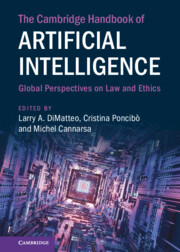Book contents
- The Cambridge Handbook of Artificial Intelligence
- The Cambridge Handbook of Artificial Intelligence
- Copyright page
- Contents
- Figures
- Contributors
- Foreword
- Preface
- Part I AI: Development and Trends
- Part II AI: Contracting and Corporate Law
- Part III AI and Liability
- Part IV AI and Physical Manifestations
- Part V AI and Intellectual Property Law
- Part VI Ethical Framework for AI
- Part VII Future of AI
- 23 AI Judges
- 24 Combating Bias in AI and Machine Learning in Consumer-Facing Services
- 25 Keeping AI Legal
- 26 Colluding through Smart Technologies
- 27 The Folly of Regulating against AI’s Existential Threat
- 28 AI and the Law
27 - The Folly of Regulating against AI’s Existential Threat
from Part VII - Future of AI
Published online by Cambridge University Press: 28 July 2022
- The Cambridge Handbook of Artificial Intelligence
- The Cambridge Handbook of Artificial Intelligence
- Copyright page
- Contents
- Figures
- Contributors
- Foreword
- Preface
- Part I AI: Development and Trends
- Part II AI: Contracting and Corporate Law
- Part III AI and Liability
- Part IV AI and Physical Manifestations
- Part V AI and Intellectual Property Law
- Part VI Ethical Framework for AI
- Part VII Future of AI
- 23 AI Judges
- 24 Combating Bias in AI and Machine Learning in Consumer-Facing Services
- 25 Keeping AI Legal
- 26 Colluding through Smart Technologies
- 27 The Folly of Regulating against AI’s Existential Threat
- 28 AI and the Law
Summary
There is an overwhelming case against the current regulation of AI for existential risks. The regulation would compromise the progress in AI because regulators could not tell which lines of research make existential threats. Part of the reason is that these risks are not imminent and are not probable, thus making identification even harder. Finally, regulating at the national level might empower rogue nations to threaten the national security of well-functioning democracies. But international regulation is not possible, because it is difficult, if not impossible, to verify that prohibited lines of research are not occurring within another nation’s territory. Encouraging with subsidies the development of AI that is not an existential threat is the best way forward, because it will build up knowledge of potential dangers.
Keywords
- Type
- Chapter
- Information
- The Cambridge Handbook of Artificial IntelligenceGlobal Perspectives on Law and Ethics, pp. 408 - 418Publisher: Cambridge University PressPrint publication year: 2022

